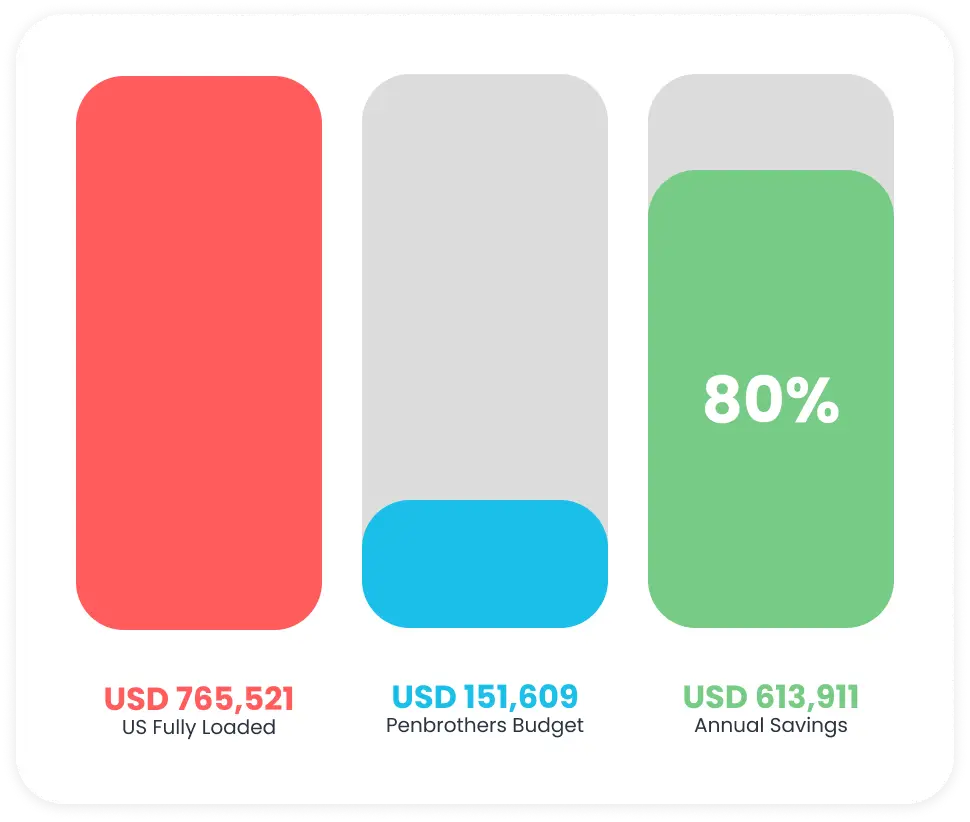Running a modern tech company comes with unique challenges that have only intensified in recent years. IT support, once seen as a supplementary function, has become the backbone of operations, ensuring seamless workflows, data security, and operational uptime. Yet, for many U.S. tech firms, the increasing demands on IT teams present significant hurdles.
First, there’s the issue of rising operational costs. Hiring skilled IT professionals domestically is expensive, with salaries, benefits, and training adding to the financial strain. For smaller companies or startups, these costs can eat into budgets earmarked for growth and innovation. For larger organizations, scaling IT teams to meet growing demands often becomes unsustainable.
On top of this, IT demands are mounting at an unprecedented pace. Businesses require IT teams to manage complex systems, implement advanced security measures, and provide round-the-clock support—all while ensuring minimal downtime. The pace of technology adoption, coupled with growing cybersecurity threats, has placed immense pressure on in-house teams, leaving many overwhelmed.
Key Takeaways
- A Strategic Solution to U.S. Tech Challenges: U.S. tech firms are increasingly outsourcing IT support to the Philippines not just to cut costs, but as a strategic solution to rising domestic operational costs, a persistent IT talent shortage, and the need for 24/7/365 support.
- Massive Cost Savings Without Sacrificing Skill: The primary driver remains significant cost efficiency, with savings of up to 70% compared to equivalent U.S. salaries. For example, a U.S.-based Technical Support Specialist earning $87,968 annually can be matched with a Filipino professional at a substantially lower cost.
- A Deep, Skilled, and Culturally-Aligned Talent Pool: The Philippines is a top choice due to its robust and growing IT-BPM sector, which is projected to reach 1.9 million employees by 2025. This talent pool is known for its high English proficiency and strong cultural alignment with Western businesses, ensuring seamless communication.
- A Full Spectrum of IT Roles Can Be Outsourced: U.S. companies are outsourcing a wide range of technical roles to the Philippines, moving far beyond basic help desk support. This includes specialized, high-value functions like Cybersecurity Analysts, Software Engineers, Cloud Engineers, and QA Engineers.
What is Tech Support Outsourcing?
Tech support outsourcing is the strategic practice of hiring a third-party provider to manage a company’s technical support functions. Instead of building and maintaining a costly in-house IT help desk, a business partners with a specialist firm to handle technical issues, troubleshoot software and hardware problems, and assist customers.
For U.S. tech firms, this model solves several key challenges: it provides access to specialized, 24/7 expertise without the overhead, dramatically reduces labor costs, and allows the core team to focus on innovation and primary business objectives rather than day-to-day IT firefighting.
How Much Does Outsourced IT Support Cost?
The cost of outsourced IT support varies based on the model. Some providers charge hourly rates (often $100+ per hour) or “per-user” fees that can become unpredictable as your team grows.
A more transparent and scalable approach is the dedicated team model. At Penbrothers, this is not a bundled “seat fee” but a clear, unbundled cost structure. Our clients pay a fixed monthly management fee that covers all operations, HR, and support, plus the team member’s direct compensation.
This model provides cost savings of 30-40% compared to hiring a single in-house IT expert in the U.S. (who can cost $70,000-$100,000 per year before benefits and overhead). It effectively delivers a full, dedicated team for a fraction of the cost of one domestic hire.
Is Outsourcing Tech Support Illegal in the U.S.?
No, outsourcing is not illegal in the United States. It is a standard business practice governed by state-level contract law.
While the act of outsourcing is legal, U.S. companies remain responsible for regulatory compliance, especially regarding data privacy. For example, any partners handling health information must be HIPAA compliant, and financial services firms must adhere to a separate set of regulations. For most tech companies, this simply means ensuring your outsourcing partner has robust security and data protection protocols, which is a core part of the partner vetting and onboarding process.
Why is IT Support Important for Your Business?
IT support is the lifeline of any modern business. It ensures that technology—the cornerstone of operations—functions smoothly, securely, and efficiently. A holistic IT support strategy encompasses several critical areas, including:
- Network Administration: Managing network infrastructure to ensure uninterrupted connectivity and optimized performance.
- Help Desk Services: Providing real-time assistance for troubleshooting technical issues faced by employees or clients.
- Cybersecurity: Protecting sensitive data and systems from ever-evolving threats.
Without comprehensive IT support, businesses face scalability issues, increased operational costs, and inefficiencies. For instance, a poorly maintained IT infrastructure can lead to frequent downtime, hampering productivity and affecting customer trust. Cybersecurity lapses, on the other hand, can result in data breaches with devastating financial and reputational consequences.
What Types of IT Support Services Exist?
Businesses today require a range of IT support services to maintain competitive operations. These include:
- Network Administration: Overseeing network setups, monitoring performance, and ensuring uninterrupted connectivity.
- Cybersecurity: Implementing robust measures to prevent data breaches, malware attacks, and other cyber threats.
- Help Desk Support: Providing timely technical assistance to employees and clients, reducing downtime.
- Technical Support: Handling software and hardware-related issues to keep systems running smoothly.
- Cloud Management: Managing cloud-based solutions for secure and scalable data storage and computing.
Each of these services plays a crucial role in ensuring secure, reliable, and efficient IT operations. For U.S. firms, accessing these services offshore offers both expertise and cost savings.
5 Reasons to Outsource IT Support to the Philippines
- Robust Talent Pool: The Philippines’ IT-BPM sector is outpacing the global market. The industry grew to 1.82 million full-time employees in 2024 and is projected to hit 1.9 million employees and $40 billion in export revenue in 2025. This 5% revenue growth significantly exceeds the 3% global industry average, demonstrating the Philippines’ expanding capacity to meet complex global IT demands.
- Cost Efficiency: Outsourcing IT support to the Philippines can save businesses up to 70% compared to U.S. salaries. Entry-level IT professionals in the Philippines earn significantly less while delivering comparable expertise.
- Cultural Alignment and English Proficiency: The Philippines remains a global leader in business English. The 2024 Pearson Global English Proficiency Report (released Jan. 2025) showed the country’s average score of 63 is “well above the global average of 57.” This high-level proficiency ensures seamless communication and cultural alignment, which is critical for collaborative IT support and development teams.
- 24/7 Support Capability: The Philippines’ time zone provides a natural advantage for U.S. businesses, enabling round-the-clock operations and ensuring rapid incident response.
Scalability and Flexibility: Outsourcing allows businesses to scale operations based on demand. With our structured Find & Vet process, firms are presented with interview-ready candidates quickly, allowing them to onboard professionals tailored to their specific needs without the friction of a traditional, lengthy hiring process.
Roles Available in the Philippines and Cost Comparison
The primary driver for outsourcing remains significant cost efficiency without compromising on skill. The figures below illustrate this by comparing the estimated cost of hiring in the United States with hiring equivalent roles in the Philippines through Penbrothers.
Cybersecurity Analyst
Defends an organization’s information systems by pinpointing vulnerabilities, monitoring networks for potential threats, and applying security measures.
DevOps Engineer
Designs, manages, and optimises infrastructure and systems to ensure reliable connectivity, performance, and operational stability.
Software Engineer
Develops, tests, and maintains software applications to meet business requirements, ensuring reliable functionality and a positive user experience.
Help Desk Support
Provides technical support and troubleshooting assistance to employees and customers, resolving software, hardware, and connectivity issues.
Data Engineer
Designs, builds, and maintains data platforms and infrastructure, ensuring scalable, reliable, and secure systems that support cloud-based applications and analytics.
IT Support Specialist
Handles system monitoring, diagnosing IT issues, and providing technical support to ensure smooth IT operations across the organization.
Web Developer
Creates, maintains, and updates websites, focusing on functionality, user experience, and visual appeal to meet business goals.
QA Engineer
Tests software and applications to identify bugs, ensure functionality, and maintain quality standards before deployment.
For a more comprehensive salary comparison of IT roles, use our salary calculator.
Offshore Staffing Calculator
Discover the total cost of hiring with Penbrothers and compare it with the costs in your country.
Discover the pricing for each specialization
Select the job position and country
Penbrother’s Success Story
How Rock Solid Digital Saved 80% on Costs
Rock Solid Digital, a web and app development agency, struggled with unreliable freelancers, unpredictable costs, and limited scalability, which disrupted their operations and client focus. They sought a solution that offered both consistency and cost efficiency to support their growth.
Partnering with Penbrothers, they built a dedicated team of full-time developers while outsourcing recruitment, payroll, and HR functions. This seamless support enabled Rock Solid to focus entirely on delivering quality results to clients and scaling their operations with greater flexibility. The results were remarkable. Rock Solid reduced payroll costs by 80% per role and gained the agility needed to stay competitive. With Penbrothers’ expertise, they streamlined operations and strengthened their position in the IT industry.
Payroll Savings For 2023

How to Start Offshoring Your IT Support to the Philippines with Penbrothers
- Outsource Specialized Roles: Gain access to reliable expertise in network administration, software support, and cybersecurity.
- Find and Vet Talent: Utilize Penbrothers’ structured scouting and vetting process to quickly access interview-ready professionals who meet your specific requirements.
- Hypercare Onboarding: We manage the crucial first 180 days—which is where most offshore teams fail—with our Hypercare Framework. This ensures new hires integrate faster and become productive long-term.
- End-to-End Support: Let Penbrothers handle recruitment, payroll, benefits, and HR, freeing your business to focus on innovation and growth.
Starting your offshoring journey with Penbrothers is simple, scalable, and cost-effective.
The Philippines offers U.S. firms a strategic solution to IT support challenges. With access to a robust talent pool, cost-efficient services, and cultural compatibility, outsourcing IT support can transform operations and drive growth.
Ready to elevate your IT strategy?
Contact Penbrothers today to discover how our full-service Filipino IT teams can help optimize your business and maximize productivity.
Frequently Asked Questions
Yes, outsourcing IT support is a completely legal and standard business practice in the United States. However, the U.S. company remains legally responsible for ensuring its foreign partners comply with any relevant data privacy regulations, such as HIPAA for health information.
The five main reasons are:
1. Access to a robust and growing talent pool of IT professionals.
2. Significant cost efficiency, with savings of up to 70% on salaries.
3. High English proficiency and strong cultural alignment with U.S. business practices.
4. The ability to easily implement 24/7/365 support due to the time zone difference.
5. Scalability and flexibility to grow or shrink teams as needed.
Companies are outsourcing a full range of IT functions, from Help Desk Support and IT Support Specialists to highly technical roles like Cybersecurity Analysts, Network Engineers, Cloud Engineers, Software Engineers, and QA Testers.
The savings are substantial. For example, a DevOps Engineer in the U.S. earns an average of $113,840 annually, while the equivalent role in the Philippines costs approximately $25,835. A Help Desk Support professional costs around $20,689 in the Philippines, compared to $51,746 in the U.S.






